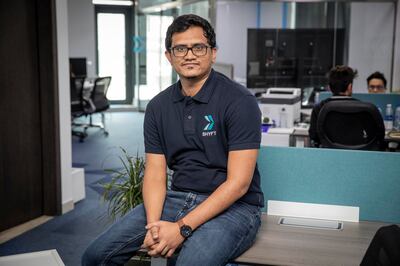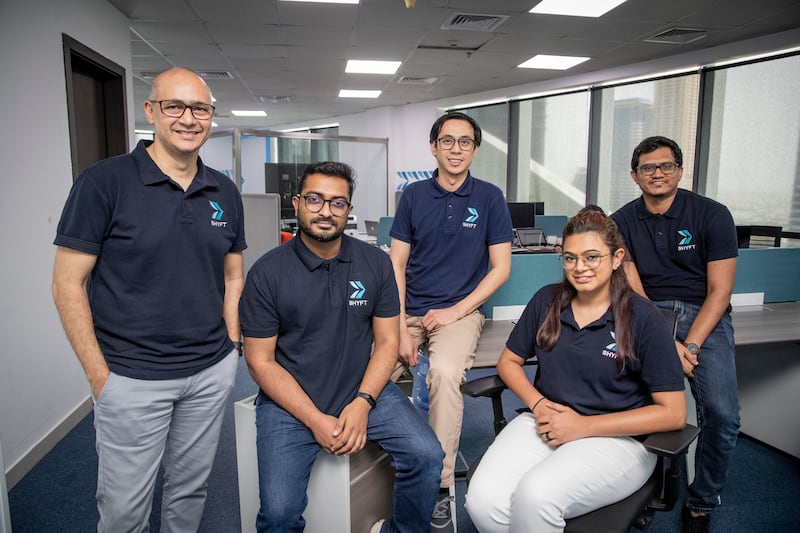When Thawseef Jaleel and Sushant Kumar first conceptualised Shyft in the first quarter of 2020, they hoped to improve airline check-in and facilitate luggage delivery.
“We wanted to simplify check-in for flights and improve the airport experience – a travel convenience app,” said Mr Jaleel, co-founder and manager of growth and market activation.
However, the Covid-19 pandemic thwarted their business idea as travel came to a halt and countries shut their borders. Looking at the new market reality, the founders – who had by then put $200,000 of savings into the business – brainstormed potential new opportunities using the growth sprint framework.
A growth sprint is used to rapidly come up with new ideas, create a product and launch it. The goal is to launch the product as soon as possible and get market feedback from customers and then use that feedback to continuously improve and scale it into a working, profitable business model.
“In our case, we set ourselves a goal to come up with new ideas and launch a product in 10 to 14 days. In just 10 days, we brainstormed ideas, did competitor research, worked out our pricing and operations, designed prototypes for our web pages and got them developed by a freelancer. We paid Dh300 ($81) for a freelancer to build that first web page and launched our service,” Mr Jaleel said.
The founders decided to launch a quick delivery service/concierge in a matter of two weeks, as they saw a new market opportunity.
The coronavirus pandemic has accelerated the rise of e-commerce in the region. About 80 per cent of young Arabs shop online frequently, compared to 71 per cent in 2019, according to a study by Wamda Capital. Additionally, 50 per cent of those aged 18 to 24 in the Middle East and North Africa are shopping more online since the pandemic began.
This has also led to an increased demand for last-mile deliveries as businesses digitise to keep up with changing consumer habits. The autonomous last-mile delivery market in the Mena region is likely to witness its revenue growing at a compound annual rate of 18.48 per cent between 2021 and 2028, according to a report by Researchandmarkets.com.
Shyft is tapping into this opportunity, enabling small and medium-sized enterprises to deliver Amazon and Noon-level service to their customers, according to Mr Jaleel. It caters to different types of businesses, such as e-commerce stores selling clothing, footwear, lifestyle products, toys, cosmetics and fitness products, as well as retail stores and gift sellers, among others.
“With e-commerce growing rapidly and huge shifts from traditional retail to e-commerce, we believe that the current version of Shyft is in a prime spot to take advantage of this seismic shift that’s happening in the region’s buying patterns,” Mr Jaleel said.
The pandemic has sparked a boom in delivery services and for any logistics company specialising in e-commerce, this is a good time as there is much room to grow and capture a slice of the market, he added.

“While Shyft started off with a two to four-hour pick-up and delivery commitment for all deliveries, as we started to scale, we realised that we had to structure and organise our operations. Hence we streamlined to offer two services: next day and same day services,” Mr Jaleel said.
The founders are also planning to launch a separate on-demand delivery team soon. Shyft is currently live in the UAE and Qatar, while international deliveries (from Dubai to Saudi Arabia, for example) are in the pipeline for this year.
Currently, Shyft has about 22,000 customers in the UAE and more than 600 businesses have registered and use the logistics start-up for their day-to-day deliveries.
The company employs 30 people in the GCC and has 60 drivers. It also has a 15-member technology and engineering team.
“Shyft has a young and diverse team based in Dubai, Abu Dhabi, Hyderabad [in India] and Doha and a lot of remote tech and engineering colleagues. We have advisers and key executives that continue to advise us and have made angel investments into Shyft from industries such as travel, logistics, as well as oil and gas” Mr Jaleel said.
Shyft's employees hail from high growth start-ups in India and the company is looking to grow quickly in the coming months, he added.
The firm is currently a pre-Series A (funding stage) company. It raised $2.5 million from private family offices in the region and has also taken some angel funding.
“Our goal is to continue to scale fast for the next six to 12 months and improve our value proposition to encompass more e-commerce business needs. We might potentially look at talking to venture capital companies by 2022 as we look to raise more funds and launch in new cities. For now though we are focused purely on growth of customers and weekly deliveries,” Mr Jaleel said.
Shyft is currently growing at about 30 per cent month-on-month in terms of the number of deliveries and adding about 40 new businesses a month. The founders hope to have more than 1,000 businesses working with them before the end of the year.

Shyft differs from other legacy courier companies. Being technologically equipped gives the start-up a big advantage, Mr Jaleel said. For instance, Shyft has built a bot that scans all delivery addresses automatically and flags issues promptly so the team can deal with them prior to delivery.
The start-up also uses technology to analyse thousands of possible delivery routes so its drivers can avoid traffic, congestion, accidents and peak times.
“We believe the mindset in the courier industry is about just delivering packages at a cheap price and being efficient – no emotions, no passion. The customer experience, customer service and customer journey in general are quite poor. Therefore, the average net promoter score for this industry is very low,” Mr Jaleel said.
Shyft is investing in technology and processes that can lead to greater loyalty.
“Succeeding as an SME e-commerce player and taking on the big boys is tough. You need to deliver an amazing experience, have great products, manage inventory and cash flow smartly and ensure the product gets to the customer super-quick and in good condition,” Mr Jaleel said.
Shyft aims to help SMEs win the big e-commerce battle through smart platforms, technology, APIs and support, “much like how Shopify helped merchants around the world succeed”, but with a proper delivery component on the ground.
“We believe we can help the next 100,000 e-commerce businesses in the Middle East and North Africa to survive and thrive.”
The main challenges for Shyft are in scaling up operations and addressing quality.
As the start-up acquires more customers, hiring dependable drivers, training them, setting up warehouses and hubs, getting roadworthy vehicles and managing teams in different locations across the UAE can be a challenge, Mr Jaleel said.
“You want to grow, maintain a certain service level, but to get there, you need to invest a lot of time, effort and money all while managing day-to-day operations and deliveries.”
Poor delivery information is a unique problem to the logistics industry and more so in the region due to the addressing system not being very efficient. Despite having modern applications like Google Maps, if a customer doesn’t enter the right address or share the right building information or street address, drivers can waste valuable time looking for locations.
“They have to manually call up customers, request for directions and waste a lot of time. For example, we have people entering addresses like Deira when buying a product but fail to mention where in Deira or which building and so on. At Shyft, we are on a mission to educate our business partners and customers on how to avoid such delays and issues,” Mr Jaleel said.
Q&A with Thawseef Jaleel, co-founder and manager of growth and market activation at Shyft
What already successful start-up do you wish you had started?
Amazon – for their insane customer obsession and gigantic scale and success. Also, in the early days, they weren’t all about profitability and living per quarter, they plan for many years ahead. Many stars like AWS and Amazon Prime are also success stories and lessons for all of us.
What new skills have you learnt in the process of launching your start-up?
We have learnt and re-learnt almost everything.
- Building a great culture is very important to attract and retain great talent
- Just because some colleagues looked good in a big corporation does not mean they can thrive at a start-up, which is all about rapid change and adaptation
- Doing things fast trumps doing things perfectly
- Iterate rapidly and keep experimenting and talking to customers
- Get your data game in order and strive to make decisions based on data
- Decide on metrics that matter, not vanity metrics that feel good but make no sense
If you could start all over again, what would you do differently?
We would not have spent so much money on the luggage application. We would build our tech in-house, versus going to a third-party agency. Because if you are serious about your technology, third parties will likely never work.
Who is your role model?
There are many, but I will pick a sporting one this time. Roger Federer for a career that is unblemished, extraordinary achievements, longevity, humility and just being an all-round nice guy.
Where do you see yourself in 10 years?
Not on a beach sipping pina colada because that gig gets boring very soon. We would like to see Shyft become a $100m-plus company with a great culture and powering e-commerce businesses across the Mena region. We would like to positively impact thousands of lives through education, employment, providing opportunities and being more sustainable.
Company profile
Company name: Shyft
Started: February 2020
Founders: Thawseef Jaleel, Sushant Kumar (India)
Based: Dubai, Doha and Hyderabad
Sector: Logistics
Funds raised: $2.5 million
Funding stage: Pre-Series A
Number of employees: 45







